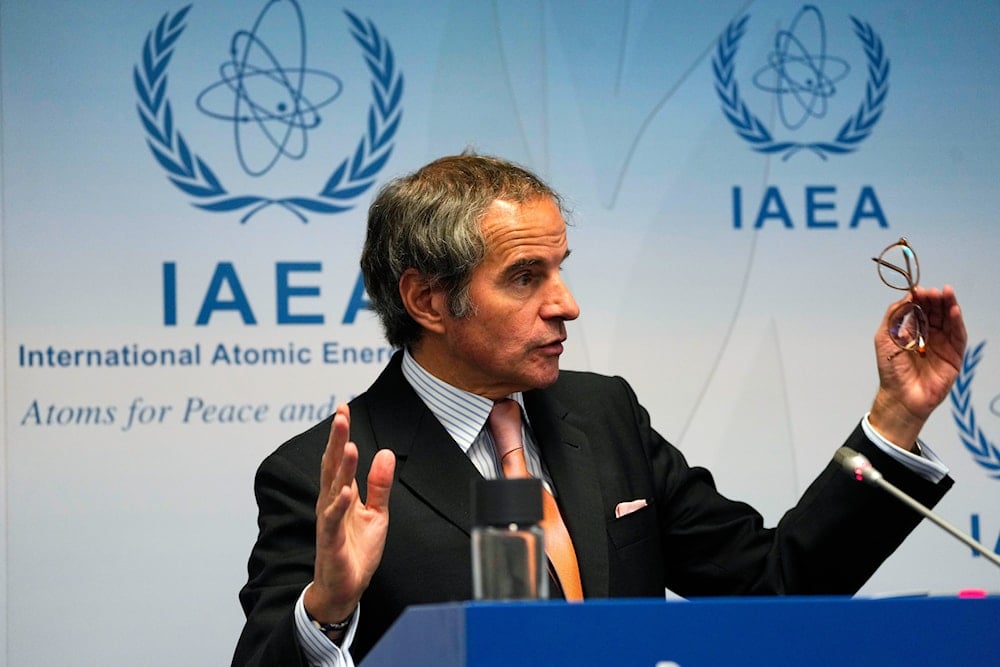IAEA chief rebuffs Trump, says no evidence Iran has nuclear weapons
IAEA chief Grossi says there's no proof Iran is seeking nuclear weapons, undercutting US and Israeli claims.
-

Rafael Mariano Grossi, the director-general of the International Atomic Energy Agency, speaks to journalists attending a weeklong seminar at the agency in Vienna, Austria, on May 28, 2025. (AP Photo/Jon Gambrell)
In a critical admission that undermines claims by the Israeli occupation and US officials, International Atomic Energy Agency (IAEA) Director General Rafael Grossi confirmed that there is no evidence Iran is pursuing a nuclear weapons program.
Speaking to CNN’s Christiane Amanpour on Tuesday, Grossi reiterated what Iran has long maintained, that the country is not systematically seeking nuclear weapons. "What we reported was that we did not have any proof of a systematic effort [by Iran] to move toward a nuclear weapon," Grossi stated, aligning his remarks with past IAEA assessments and independent sources.
His comments come at a time of renewed scrutiny following the IAEA Board of Governors’ recent resolution against Iran, which accused Tehran of non-compliance with nuclear obligations, a claim Iranian officials have firmly rejected as politically motivated.
Iran dismisses IAEA censure, reaffirms NPT commitments
Iranian authorities maintain that the Joint Comprehensive Plan of Action's (JCPOA) obligations are no longer binding due to the failure of Western signatories, particularly European nations, to uphold their commitments. However, they stress that Iran continues to operate within the framework of the Nuclear Non-Proliferation Treaty (NPT) and the IAEA’s Safeguards Agreement.
Unlike Iran, the Israeli occupation has refused to sign the NPT, a longstanding point of contention in regional non-proliferation diplomacy. Additionally, Tehran cites a religious decree by the Iranian leader, Sayyed Ali Khamenei, prohibiting the development or possession of nuclear weapons.
Grossi’s comments were made just days after Trump repeated long-debunked claims about Iran's alleged nuclear weapons ambitions. His remarks coincided with ongoing Israeli military aggression against Iran, including an attack on the Natanz nuclear facility in Isfahan, which resulted in casualties among military officials, scientists, and civilians.
The Israeli occupation's actions have drawn widespread condemnation for violating international law and escalating regional tensions. In retaliation, Iran launched Operation True Promise III, a multi-phase retaliatory military response.
Eleven phases of the operation have so far been carried out with what Tehran has called "tremendous success."
'Israel’s' nuke hype vs. US intel
A CNN report on Tuesday argued that as the Israeli occupation launched a series of strikes on Iranian territory last week, it justified its actions by claiming Iran was rapidly approaching nuclear weapons capability. However, US intelligence officials offered a sharply different assessment, concluding that Iran is not actively pursuing a nuclear bomb and is likely still years away from being able to build and deliver one to a target of its choosing, CNN reported, citing four people familiar with the assessment.
According to the officials, the US assesses that Iran is at least three years away from developing a deployable nuclear weapon.
One US official told CNN that despite the extensive Israeli bombing campaign, including the heavily damaged Natanz enrichment facility, Iran’s core nuclear capability, particularly at Fordow, remains largely intact.
Fordow, a fortified enrichment plant built deep into a mountain, has not been significantly affected by the airstrikes. Experts say the site cannot be destroyed without advanced US weaponry, including bunker-busting bombs and B-2 bombers, which the Israeli military does not possess.
However, Trump dismissed the reports, simply saying, "I don't care." He claimed that Iran was "very close" to acquiring a nuclear weapon, directly contradicting official assessments from the US intelligence community and US Director of National Intelligence Tulsi Gabbard.
During an exchange with a CNN reporter on Tuesday, Trump was asked how close he believed Iran had been to obtaining a nuclear weapon. The question came in light of testimony from Gabbard earlier this year, in which she cited the intelligence community’s continued assessment that Iran was not pursuing nuclear weapons.
"The IC continues to assess that Iran is not building a nuclear weapon,” Gabbard said during her March testimony. "Supreme Leader Khamenei has not authorized the nuclear weapons program that he suspended in 2003."
Trump, however, dismissed those findings outright. “I don’t care what she said,” he replied. “I think they were very close to having one.”

 4 Min Read
4 Min Read









